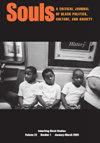States of Security, Democracy’s Sanctuary, and Captive Maternals in Brazil and the United States
IF 0.1
4区 哲学
Q4 ETHNIC STUDIES
引用次数: 4
Abstract
How might we understand the current political formations that emerged from the election of Donald Trump in the United States and the parliamentary coup in Brazil? Despite the U.S. disavowal for human rights violations in foreign policies, the victory of explicitly anti-black, anti-female, anti-gay, anti-poor forces in both democracies seems to be part of the vociferous restructuring of global racial capitalism, apartheid enforced by law and police violence. The more conventional analysis is that the Brazilian coup and Trump's election represent a threat to electoral democracy. Within this perspective, the protests generated by the outcomes of electoral politics in the United States and Brazil aimed to counter the reproduction of white supremacy and racial capital. We propose an alternative reading: the political conflicts that emerged in the aftermath of both events illustrate democracy's strength and its fulfilling promise to maintain racial domination and the political grammar that authorizes its reproduction. If we consider the continuum of racial violence—from slavery to democracy—that permeated the human rights–oriented Obama and Rousseff administrations, why would we unquestionably accept that liberal democracy is the pathway to racial integration and to control anti-black violence and police terror in Brazil and the United States?安全国家,民主的庇护所,以及巴西和美国的被俘母亲
我们该如何理解唐纳德·特朗普(Donald Trump)当选美国总统和巴西议会政变后出现的当前政治格局?尽管美国否认在外交政策中侵犯人权,但这两个民主国家中明确反对黑人、反对女性、反对同性恋、反对穷人的力量的胜利,似乎是全球种族资本主义、法律和警察暴力强制实施的种族隔离的喧嚣重组的一部分。更传统的分析是,巴西政变和特朗普当选代表着对选举民主的威胁。从这个角度来看,美国和巴西选举政治结果引发的抗议活动旨在反对白人至上主义和种族资本的再生产。我们提出另一种解读:这两个事件之后出现的政治冲突说明了民主的力量及其维持种族统治的实现承诺,以及授权其复制的政治语法。如果我们考虑种族暴力的连续性——从奴隶制到民主——渗透到以人权为导向的奥巴马和罗塞夫政府,为什么我们会毫无疑问地接受自由民主是通往种族融合和控制巴西和美国的反黑人暴力和警察恐怖的途径呢?
本文章由计算机程序翻译,如有差异,请以英文原文为准。
求助全文
约1分钟内获得全文
求助全文

 求助内容:
求助内容: 应助结果提醒方式:
应助结果提醒方式:


